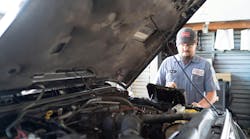Assistant Editor Craig Truglia recently made a case for technician licensing in his blog, “Mandatory technician licensing: it’s a matter of public safety.” Craig, who is an ASE-certified technician and a shop owner, argues that the importance of the auto technician’s role calls for mandatory licensing.
Craig correctly notes that auto technicians, because they service automobiles, play a big role in supporting public safety.
I know how strongly he feels, and I agree with Craig that technician training is important, not just for the benefit of the automotive trade, but to the public at large.
Where I take a different view is what the government’s role should be in verifying a technician’s competence.
The automotive industry, under the auspices of the National Institute for Automotive Service Excellence, has since 1972 done an outstanding job administering and promoting its voluntary Automotive Service Excellence (ASE) program. The ASE has established a well recognized training certification which most serious technicians subscribe to. The organization claims to have certified more than 350,000 technicians nationwide.
The ASE certification commands the industry’s and the consumer’s respect, thanks to the organization’s integrity and the industry’s support.
There’s an old cliché that is corny as heck, but it nonetheless states the case succinctly: “If it ain’t broke, don’t fix it.”
From my experience observing various service industries, it’s hard to see what a mandatory, government administered-training program could do to improve the quality of technician training beyond what the ASE has provided.
Most techs already choose voluntary certification.
Professional Tool & Equipment News’ most recent reader survey found that more than 60 percent of the magazine’s readers are ASE-certified. The research further found than half the magazine’s readers have 10 or more hours per year and close to 40 percent more than 20 hours.
It’s doubtful that making training mandatory will encourage the minority of techs that aren’t certified to become certified.
Enforcing such a mandate would be next to impossible.
One thing I would expect based on my experience as a service industry observer is that a government-administered program will cost more, and that cost will ultimately be passed on to the industry and the consumer.
The percent of ASE-certified techs is far from perfect. But it’s a lot more than most established service industries can claim.
Clearly, a significant percentage of technicians and shop owners find the existing training program useful.
The automotive aftermarket has a lot to be proud of. The industry should continue on its present course of voluntary training certification.


